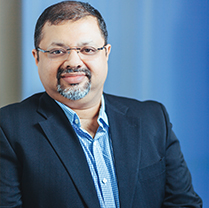Pearson Clinical & Talent Assessments is tapping on the spurt in mid and large market enterprises in India by launching technology and mobile – based assessment tools which help companies reach potential employees, even in Tier-II and Tier-III regions. Matching unique individual skills to the right roles is the way forward in recruitment, believes country manager and director, Philip Kurian.

If you observe the global talent assessments and hiring industry today, be it the startup or multinational corporation ecosystem, ownership and ‘right talent’ have taken over rather than a one size fits all approach. In other words, companies have begun to realise that every individual is unique and carries a distinct set of skills and a single programme cannot address everyone’s needs. This, coupled with the mushrooming of multiple technology enterprises, especially in markets like India, has made it imperative for companies to use talent assessment technologies to meet manpower demands. Just the sort of opportunity that Pearson Clinical & Talent Assessments (Pearson TalentLens) is keen to capitalise on. “According to a leading business data aggregator India has 4,791 multinational corporations as of December 2016. This number alone is sufficient to tell us that India has no dearth of talent. The real challenge lies in identifying the right talent, with the required skill sets, who can fit the role. This is where we come in,” opines Philip Kurian, country manager and director, Pearson TalentLens.
While the company has been active in the talent assessments space for over 85 years now, its foray into the India market marks its specific focus on technology-based assessments, especially in Tier-II and Tier-III regions. Take for example, its launch of Hire.me, a mobile recruitment solution to help companies reach, engage, assess and shortlist candidates through remote technology. “Given the vastness of India and the huge reservoir of potential employees away from Tier-I cities, logistics leading to recruitments is a big problem. This is what we are trying to solve with our mobile app,” explains Kurian. Moreover, the company is taking a solution-based rather than a product-based approach to tackle the hiring challenge in India, while relying on big data and SaaS-model based solutions to grow.
The other challenge has been dealing with the cultural mindset of some of the HR professionals. Though assessments help reinforce the process and give a better, tangible result, they shift the control from HR to process. Having said that, the number of the progressive and forward thinking HR managers is burgeoning and this gives us ample opportunity, as they understand the importance of such assessments
The question is, where does India stand when compared to global markets, in terms of availability of quality talent? Have we moved away from a one size fits all approach to tapping on specific strengths of employees? What kind of technologies are emerging in India’s talent assessments space? Kurian throws light on these very topics in a tête-à-tête with The Smart CEO, while also sharing glimpses of the company’s future plans.
You were the director at Pearson Education before you took up the role of country head for Pearson’s talent assessment division. What role (and to what extent) do you think education plays in helping employees develop the right skills for a job role?
More often than not education is the foundation that shapes an individual’s future. While a lot of factors contribute towards making education comprehensive, it is the learning that an individual gets which is far more important. What matters is the kind of education given, the knowledge imparted, the way it has been done so and what one learns from it.
The next stage would be to refine the knowledge so as to cater to the individual’s capability. Every individual is unique and comes with his/her own skill sets and expertise and the right education can help tap and explore one’s potential to the fullest.
Ultimately, based on this strategy, an organisation plans recruitment accordingly, as people capital is at the fulcrum. In fact, this is a belief which is core to our business; that companies should be enabled to find the right role that could do justice to one’s skill set. Our development solutions are tailor-made to fit individual requirements. Before every learning and development programme, candidates go through pre-assessments to evaluate their strength and weakness. Based on the results, a customised development strategy is designed, thus, ensuring that learning is done as per individual requirement.

Who is your addressable market and what kind of an opportunity do you see for Pearson TalentLens to make deeper forays into the country?
All corporates (small to large) with a forward thinking view on recruitment and development of human capital fall under our addressable market. This can span across all industries – aviation, IT, hospitality, pharma, retail and manufacturing and this approach start from the entry level right up to the CXO level.
Over the years, we have come across various talent assessment solutions, which analyse individuals based on various personal and professional attributes. Companies have come to realise the importance and impact of such assessment tools when hiring candidates in large volumes. Pearson TalentLens latest offering, Hire.Me, addresses the need of a technology driven entity in today’s world. Hire.Me is a pre-hire integrated mobile technology platform, which enables employers to make large volume hiring on the go without comprising on the quality of candidates with a faster turn around time, keeping in mind the Indian employer and employee requirements for best results.
What are some new technologies which have emerged in the talent assessments space in the last three years?
As the fulcrum of recruitment moves from the corporate to the individual (potential employee), which is similar to B2C business dynamics, we have launched products that are platform and form-factor agnostic. While Hire.me is one example, another product we have is Versant, an automated communication skills test which works across form-factors. Typically, this test is highly reliable and is specifically designed to analyse speech using patented speech processing technology. It is both web-enabled and can also be taken via telephone. The invigilation feature with real-time recording, browser policing and analytics ensures authentication of the remote candidates.
What are some key challenges you face today and how do you tackle them?
Our biggest challenge so far has been that we are widely recognised as an education company. While this gives us easy brand recall, it takes away the focus from being identified as an assessment company. To overcome this we have a sharp focus on reaching out to the HR fraternity by increasing our interactions with them through multiple touch points and engagements. We are also making our brand visible at events and conferences. In the coming months, we will be exploring direct marketing activities. Given the nature of our solutions, we want to be positioned as thought leaders in the assessment space.
The other challenge has been dealing with the cultural mindset of some of the HR professionals. Though assessments help reinforce the process and give a better, tangible result, they shift the control from HR to process. Having said that, the number of the progressive and forward thinking HR managers is burgeoning and this gives us ample opportunity, as they understand the importance of such assessments.

What is your game plan for Pearson TalentLens in India over the next three years?
For a start we are taking on a multi-industry approach. We have focussed on IT and ITES businesses so far but now we plan to tap other segments. As a part of this effort, we are engaging with three of the top management consulting firms and we have opened doors in India’s largest retailing company and provide solutions for companies in the hospitality, shipping and healthcare space.
We want to be solution centric since we have a bouquet of products which cater to the various levels of an organisation. On this front, we are working with large Indian corporates in setting up virtual assessment centres for leadership development of their employees, especially, mid and senior management.
Finally, big data will be our third focus area; we aim to leverage our global footprint to provide analyses to corporates to facilitate better assessments. It would be best elucidated with IT to arrive at the right fit in terms of employee skills and company requirement, thereby, improving the quality of recruitment.
On Leadership
I am always quietly aggressive. I strongly believe in delegation of work including handing over responsibility and authority to the team. I like to hire team members who have the potential to be in my shoes
